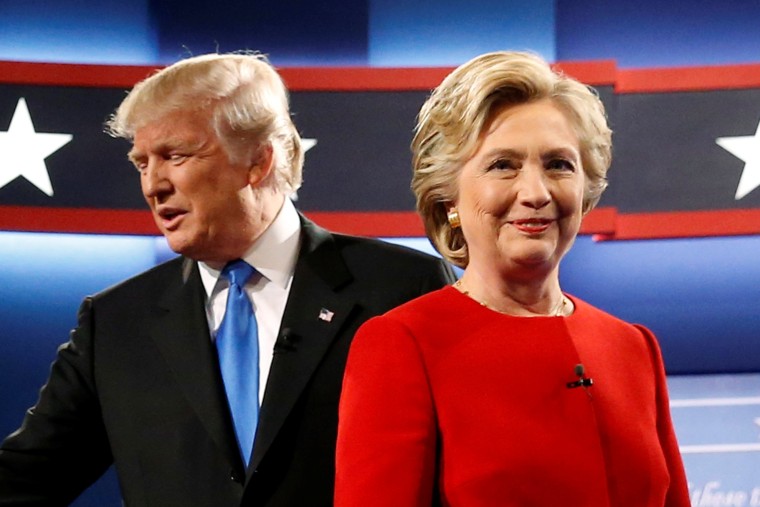Hillary Clinton needs to lock down the support of the Obama coalition — namely minorities, women and young voters — to win the White House. She addressed issues important to two of those three groups during Monday's presidential debate but many young voters still aren't feeling the love.
Clinton made an appeal to minorities by highlighting the successes of the country’s first African-American president, accusing Trump of spreading a “racist birther lie,” and elaborating how minorities are unfairly targeted with the use of stop-and frisk. She attacked Trump for previously calling women “pigs, slobs and dogs." But her appeal to young voters was decidedly less obvious.
Related: Clinton: Debate Exposed Trump's 'Dangerously Incoherent' Policies
“I think last night’s debate was not geared at millennials, which is disappointing because so many were watching and hoping they would hear about the issues they care most about or get inspired to go out and vote this year,” said Ashley Spillane, former president of Rock the Vote and current millennial and voter engagement strategist.
While some issues that young voters care about, including criminal justice reform, were covered during the combative debate, other high priority issues were barely acknowledged, Spillane noted. That includes student loan debt, the sharing economy, climate change, a woman’s right to choose, LGBT issues and opportunities millennials will have when they graduate college.
Several millennials, including Mitchell Podgorowiez, an undecided voter and junior at Hofstra University, were looking forward to the first presidential debate on Monday night — hoping it would give them some clarity on which candidate to choose when they cast their ballots for the first time ever this November.
Related: Trump Adviser Giuliani: 'I Wouldn't Participate in Another Debate'
But after watching Clinton and Donald Trump go head-to-head at his school at an on-campus viewing party with approximately 200 of his fellow classmates, one thing was certain: “It made me even more undecided,” said the 20-year-old. “What I saw was Donald Trump reverting to his own primary self and Hillary Clinton acting very robotic … There was a lot of blame and broad strokes rather than details.”
History shows that younger voters tend to vote for Democratic candidates. This group was crucial to President Obama’s wins in 2008 and 2012. But Clinton has under-performed among millennial voters, particularly in the primary as many turned to Bernie Sanders — and consequently more are now considering third party candidates like Gary Johnson or Jill Stein.
According an NBC News|SurveyMonkey Weekly Election Tracking Poll released just hours before the debate, 49 percent of those under the age of 30 said they backed Clinton versus 26 percent for Trump. Meanwhile, 16 percent of those 18 to 29 said they backed Johnson and 7 percent for Stein.
Juliana Spano, a senior at Hofstra, also said she was undecided after the debate and would have liked to hear more about climate change. Trump, she said, came off as too aggressive, while Clinton didn’t come off strong enough. She’s now considering voting for Johnson or Stein, but acknowledged, “It’s hard to vote for someone you know isn’t going to win.”
Related: Who's Alicia Machado, the Woman Trump Allegedly Called 'Miss Piggy'?
Clinton’s biggest fear may be that millennials stay home and don’t come out to vote.
“Millennials are no fans of Trump and last night likely didn't change that at all," said Kristen Soltis Anderson, a Republican pollster and author of “The Selfie Vote: Where Millennials Are Leading America. "He hammered home the themes that have appealed to an older, whiter audience, but stumbled on issues such as race and clean energy. Trump's strategy is clearly to maximize his appeal to older voters and hope young voters stay home.”
"Trump's strategy is clearly to maximize his appeal to older voters and hope young voters stay home.”
So Clinton’s biggest enemy isn’t necessarily Trump when it comes to millennials. “It's apathy and third-party voting. Given that metric, it's not clear to me if she did enough to make the case about 'why her?' to get tuned-out younger voters to tune back into her. It was a perfectly fine performance but I don't know if she had any stand-out moments that will stir the hearts of wary millennials,” added Soltis Anderson.
Clinton may be seeking to change that in the days to come. Sanders will campaign in New Hampshire with her on Wednesday at the University of New Hampshire, where they're expected to discuss college affordability. Other high-profile surrogates, including Vice President Joe Biden and First Lady Michelle Obama, will campaign for Clinton at Philadelphia universities this week.
The Democrat appears focused on winning the group over. Last week, she wrote an op-ed targeted to young voters titled: “Here’s what millennials have taught me.” She also endured a purposefully awkward comedic interview with Zach Galifianakis on “Between Two Ferns" that seemed engineered to tickle the funny bones of the 20-something set.
Some young voters are convinced. Hofstra junior Molly Sonenberg, who was undecided before the debate, said she would vote for Clinton now, although she wished the candidates talked about the gender pay gap, something she says she cares deeply about. “Trump seemed unprepared. He kept cutting her off and seemed immature and inappropriate and he dodged all the questions,” said Sonenberg.
As for how Podgorowiez will make up his mind: “We still have two more debates,” he said.
